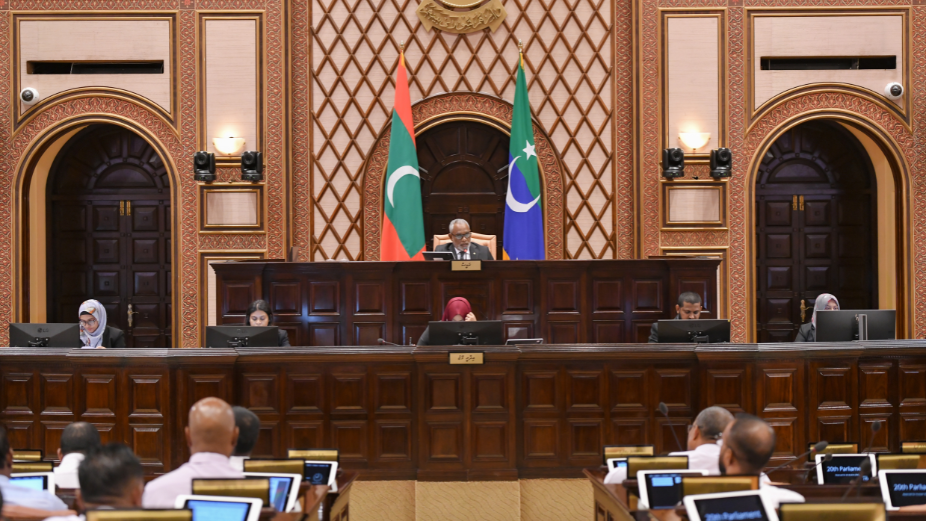
The Maldivian government has introduced a proposed amendment to the Penal Code aimed at tackling unjust enrichment among public officials. Announced by President Mohamed Muizzu, the amendment seeks to streamline the prosecution of former public servants who may have amassed wealth beyond what would be consistent with their official earnings. This amendment, introduced in Parliament by Progressive National Congress (PNC) MP Hussain Riza Adam, is set for its first reading on Monday. It focuses on updating Article 515 of the Penal Code, which defines unjust enrichment by public officials, to remove legal ambiguities that currently complicate investigations.
The proposed changes specify actions that would constitute unjust enrichment for both current and former public officials. These include maintaining a lifestyle that appears beyond one’s financial means, acquiring properties or assets that do not align with one’s income while in office, and failing to provide a legal justification for wealth owned by close associates or family members. Though these criteria are present in the current law, the amendment aims to clarify them to facilitate more effective prosecution of unexplained wealth during public service.
One significant shift proposed in the amendment is the change in the burden of proof required to demonstrate unjust enrichment. Currently, the law requires the prosecution to prove that any unexplained wealth was obtained through “a serious criminal offence,” a standard that has made successful prosecutions challenging. The amendment would remove this requirement, focusing instead on recovering assets without needing to establish a link to a specific criminal act. Attorney General Ahmed Usham has noted that proving a direct connection to criminal activity has hindered previous prosecutions, and the amendment is intended to address this issue.
Additionally, the amendment proposes stricter penalties for high-ranking officials, including the President, ministers, Members of Parliament, and judges. Under the new amendment, unjust enrichment for these officials would be considered a second-degree felony, which carries a heavier sentence than the third-degree felony classification for other public officials. Currently, a third-degree felony results in a prison sentence of three years and two months, while a fourth-degree felony carries a sentence of one year and seven months.
However, while the amendment aims to enhance accountability, it has also sparked concerns over potential misuse as a political tool. By eliminating the need to link unexplained wealth to criminal activity, there is a risk that the law could be selectively enforced, allowing those in power to target political opponents. In other countries with similar laws, unjust enrichment regulations have sometimes been used to discredit or prosecute dissenting voices under the guise of anti-corruption efforts. The concern is that, in the Maldives, the amended law could be wielded to sideline opposition figures, especially if investigations into wealth and assets disproportionately focus on political opponents.
This potential for selective enforcement raises questions about how fairly the amendment might be applied. With the shift in the burden of proof, opponents of the ruling government could face heightened scrutiny or legal challenges, even if their assets were acquired legitimately. The proposed changes could, therefore, influence public perception by framing political rivals as financially suspect, undermining their credibility.
The proposed amendment also aligns with practices in other democracies that have introduced legal frameworks to address unexplained wealth among public officials. In Hong Kong, for example, the Prevention of Bribery Ordinance criminalises unexplained wealth among public servants, requiring officials to justify assets that do not match their known income. Ecuador’s approach includes strict penalties for illicit enrichment, including prison sentences and a lifetime ban from public office. Internationally, the United Nations Convention Against Corruption (UNCAC) has encouraged states to enact laws against illicit enrichment, acknowledging the difficulty in gathering direct evidence of corruption.
These examples reflect global efforts to combat corruption through laws addressing unexplained wealth, though they also highlight the challenges of ensuring such laws are applied impartially. For the Maldives, while the amendment could support the pursuit of legitimate anti-corruption cases, its broad application could risk politicising the legal process. Balancing robust anti-corruption measures with safeguards against selective enforcement will be key to fostering accountability without undermining democratic principles.












